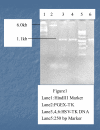A novel Bifidobacterium infantis-mediated TK/GCV suicide gene therapy system exhibits antitumor activity in a rat model of bladder cancer
- PMID: 20015348
- PMCID: PMC2803447
- DOI: 10.1186/1756-9966-28-155
A novel Bifidobacterium infantis-mediated TK/GCV suicide gene therapy system exhibits antitumor activity in a rat model of bladder cancer
Abstract
Bladder cancer is the ninth most common malignancy in the world. Successful clinical management remains a challenge. In order To search for novel targeted and efficacious treatment, we sought to investigate anti-tumor activity of BI-TK suicide gene therapy system in a rat model of bladder tumors. We first constructed and tested an anaerobic Bifidobacterium infantis-mediated thymidine kinase (BI-TK) suicide gene therapy system. To test the in vivo efficacy of this system, we established a rat model of bladder tumors, which was induced by N-methyl-nitrosourea perfusion. Bifidobacterium infantis containing the HSV-TK (i.e., BI-TK) were constructed by transformation of recombinant plasmid pGEX - TK. The engineered BI-TK was injected into tumor-bearing rats via tail vein, followed by intraperitoneal injection of ganciclovir (GCV). Using the rat model of bladder tumors, we found that bladder tumor burdens were significantly lower in the rats treated with BI-TK/GCV group than that treated with normal saline control group (p <0.05). While various degrees of apoptosis of the tumor cells were detected in all groups using in situ TUNEL assay, apoptosis was mostly notable in the BI-TK/GCV treatment group. Immunohistochemical staining further demonstrated that the BI-TK/GCV treatment group had the highest level of caspase3 protein expression than that of the empty plasmid group and normal saline group (p < 0.05). Thus, our results demonstrate that the Bifidobacterium infantis-mediated TK/GCV suicide gene therapy system can effectively inhibit rat bladder tumor growth, possibly through increasing caspase 3 expression and inducing apoptosis.
Figures




Similar articles
-
Bifidobacterium infantis-mediated HSV-TK/GCV suicide gene therapy induces both extrinsic and intrinsic apoptosis in a rat model of bladder cancer.Cancer Gene Ther. 2013 Feb;20(2):77-81. doi: 10.1038/cgt.2012.86. Epub 2012 Dec 21. Cancer Gene Ther. 2013. PMID: 23258087
-
The antitumor effect of suicide gene therapy using Bifidobacterium infantis-mediated herpes simplex virus thymidine kinase/ganciclovir in a nude mice model of renal cell carcinoma.Urology. 2014 Oct;84(4):982.e15-20. doi: 10.1016/j.urology.2014.05.020. Epub 2014 Aug 12. Urology. 2014. PMID: 25123427
-
Proteomic analysis of bladder cancer by iTRAQ after Bifidobacterium infantis-mediated HSV-TK/GCV suicide gene treatment.Biol Chem. 2013 Oct;394(10):1333-42. doi: 10.1515/hsz-2013-0201. Biol Chem. 2013. PMID: 23893687
-
Exogenous wt-p53 enhances the antitumor effect of HSV-TK/GCV on C6 glioma cells.J Neurooncol. 2007 May;82(3):239-48. doi: 10.1007/s11060-006-9279-x. Epub 2006 Nov 11. J Neurooncol. 2007. PMID: 17102907
-
Nanoscale bubble ultrasound contrast agents-mediated suicide gene therapy system, Nanoscale bubble-LV5-YCD-TK/GCV/5-FC, effectively inhibits bladder cancer cell growth.Eur Rev Med Pharmacol Sci. 2019 Jan;23(1):75-86. doi: 10.26355/eurrev_201901_16751. Eur Rev Med Pharmacol Sci. 2019. PMID: 30657549
Cited by
-
Gene-directed enzyme prodrug therapy.AAPS J. 2015 Jan;17(1):102-10. doi: 10.1208/s12248-014-9675-7. Epub 2014 Oct 23. AAPS J. 2015. PMID: 25338741 Free PMC article. Review.
-
Bifidobacterial recombinant thymidine kinase-ganciclovir gene therapy system induces FasL and TNFR2 mediated antitumor apoptosis in solid tumors.BMC Cancer. 2016 Jul 27;16:545. doi: 10.1186/s12885-016-2608-3. BMC Cancer. 2016. PMID: 27464624 Free PMC article.
-
Harnessing intratumoral microbiota: new horizons in immune microenvironment and immunotherapy.J Transl Med. 2025 Aug 12;23(1):897. doi: 10.1186/s12967-025-06916-2. J Transl Med. 2025. PMID: 40797326 Free PMC article. Review.
-
Bacteria-cancer interactions: bacteria-based cancer therapy.Exp Mol Med. 2019 Dec 11;51(12):1-15. doi: 10.1038/s12276-019-0297-0. Exp Mol Med. 2019. PMID: 31827064 Free PMC article. Review.
-
An Aqueous Extract of a Bifidobacterium Species Induces Apoptosis and Inhibits Invasiveness of Non-Small Cell Lung Cancer Cells.J Microbiol Biotechnol. 2020 Jun 28;30(6):885-893. doi: 10.4014/jmb.1912.12054. J Microbiol Biotechnol. 2020. PMID: 32238777 Free PMC article.
References
-
- Sela DA, Chapman J, Adeuya A, Kim JH, Chen F, Whitehead TR, Lapidus A, Rokhsar DS, Lebrilla CB, German JB, Price NP, Richardson PM, Mills DA. The genome sequence of Bifidobacterium longum subsp. infantis reveals adaptations for milk utilization within the infant microbiome. Proc Natl Acad Sci USA. 2008;105:18964–18969. doi: 10.1073/pnas.0809584105. - DOI - PMC - PubMed
-
- Hamaji Y, Fujimori M, Sasaki T, Matsuhashi H, Matsui-Seki K, Shimatani-Shibata Y, Kano Y, Amano J, Taniguchi S. Strong enhancement of recombinant cytosine deaminase activity in Bifidobacterium longum for tumor-targeting enzyme/prodrug therapy. Biosci Biotechnol Biochem. 2007;71:874–883. doi: 10.1271/bbb.60502. - DOI - PubMed
-
- Cinque B, Di Marzio L, Della Riccia DN, Bizzini F, Giuliani M, Fanini D, De Simone C, Cifone MG. Effect of Bifidobacterium infantis on Interferon- gamma- induced keratinocyte apoptosis: a potential therapeutic approach to skin immune abnormalities. Int J ImmunopatholPharmacol. 2006;19:775–786. - PubMed
Publication types
MeSH terms
Substances
LinkOut - more resources
Full Text Sources
Medical
Research Materials

